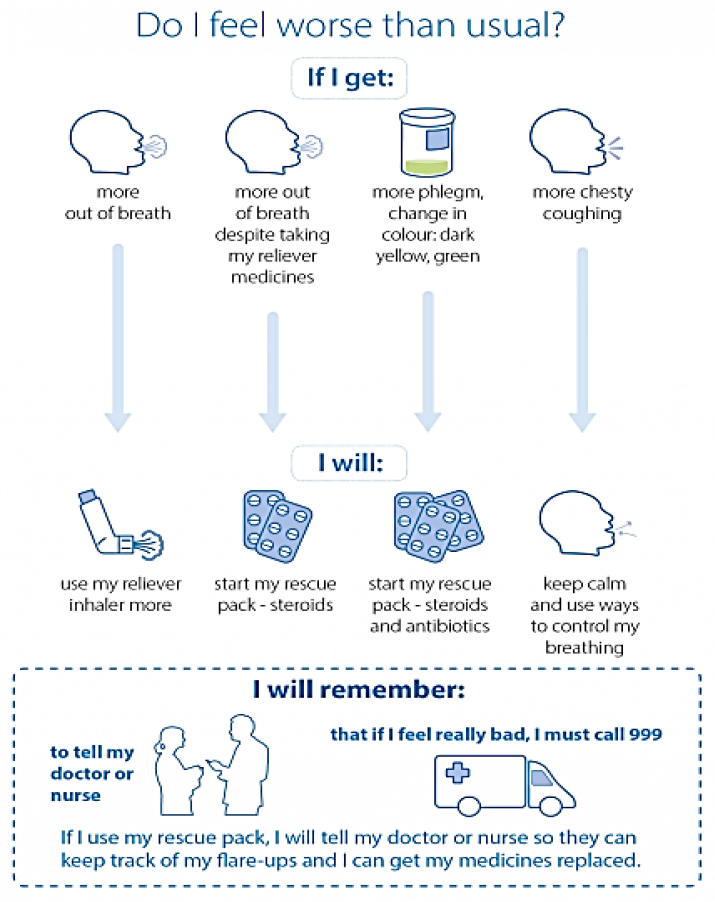Exacerbation of COPD and what to expect after discharge
This page gives you information about COPD and how you can help to reduce the chances of another attack.
What is COPD?
COPD (Chronic Obstructive Pulmonary Disease) is a group of chronic lung conditions that cause permanent narrowing of the airways and difficulties with taking in oxygen and removing carbon dioxide from the blood stream. COPD is usually the result of inhalation of harmful substances, most commonly cigarette smoke. There are some rare genetic conditions that may cause COPD, mainly in younger patients.
The most important thing to do if you have COPD is to stop smoking. If you are a current smoker and are keen to stop, there are details how to access support at the end of this page.
Exacerbation of COPD
For many people their COPD is manageable on a day-to-day basis. However, from time to time, things can temporarily get worse – this is an exacerbation. Exacerbations can be triggered by a number of factors such as infection, changes in the weather or exercise.
Often exacerbations can be managed at home with increased use of inhalers and a short course of steroids.
If very severe, COPD exacerbations can be life-threatening and need urgent treatment in hospital. Treatment may include oxygen and nebulisers.
If the cause of the exacerbation is thought to be an infection, a course of antibiotics may be needed.
More information about COPD can be found at:
Asthma + Lung UK
Website: www.asthmaandlung.org.uk/conditions/copd-chronic-obstructive-pulmonary-disease
This website has useful advice about a wide range of issues related to COPD.
What to do after an exacerbation of COPD?
Your symptoms should start to improve 2 to 3 days after starting treatment.
You should complete any course of steroids or antibiotics you have been prescribed. If you are taking long term steroids (usually prednisolone) or have been on a prolonged course, the dose may need to be slowly reduced rather than stopping abruptly.
While your breathing should get better after an exacerbation, it often does not quite get back to the same level as before.
Signs that might suggest things are getting worse or you are developing another flare up are:
- Increased breathlessness that does not get better after a short time
- Increased coughing
- Producing more sputum
- Your sputum changes in consistency or colour.
If you are having 2 or more exacerbations of COPD a year, you may be suitable to keep a course of antibiotics and steroids at home, known as a rescue pack. You will be assessed for this in hospital or by your GP.
Follow up arrangements
Your inhaler treatment and need for steroids and antibiotics should have been explained before you are discharged from hospital. If you did not understand the information or you have some concerns or questions, please ask your nurse or doctor before leaving.
It is recommended that you should have a review of your COPD in the first 4 weeks after discharge. This would usually be with your GP or COPD nurse. The purpose of this review is to check your symptoms and make sure that you are on the correct medication. Your GP or COPD nurse will also check that you have been shown the best way to use your inhalers.
A further review is recommended at 12 to 16 weeks. This is similar to the above review, but will also provide an opportunity for your lung function to be assessed with some breathing tests (called spirometry). This will be arranged through your GP but may take place at a community health centre rather than at the practice. If a hospital follow up appointment is needed, it will be arranged and the details sent to you.
You should see the COPD nurse at your GP’s practice once a year for a review of your inhalers, medication and management of your COPD.
Pulmonary rehabilitation
This is a 6-week educational and exercise course for people with COPD, delivered twice a week online or in person. Attending the course can help in reducing breathlessness and improving your quality of life. You will be assessed for this by your hospital respiratory team or by your GP practice.
Smoking cessation support
If you are a current smoker and are keen to give up, support is available from Healthy Lifestyles. You can access this support by visiting their website or you can telephone using the number below.
Website: www.hlsglos.org
Tel: 0800 122 3788
